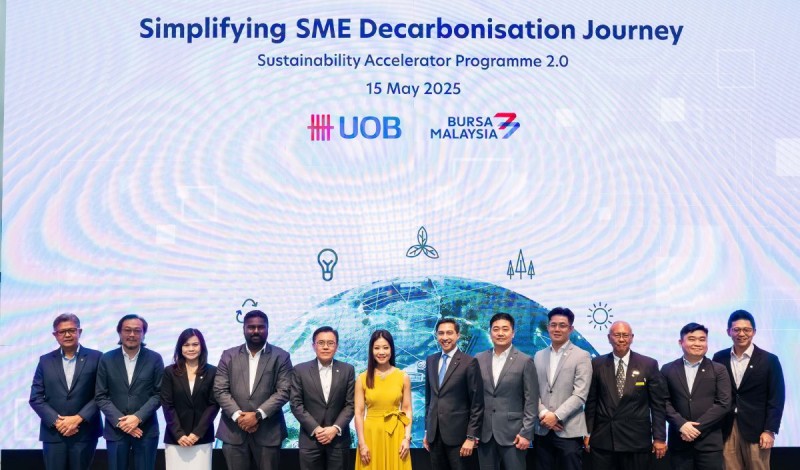
In a meaningful step towards advancing sustainability, UOB Malaysia has joined hands with various industry players to support small and medium enterprises (SMEs) in navigating their environmental responsibilities. This initiative addresses a growing need to prepare SMEs for the upcoming Scope 3 emissions reporting requirements, which will start to be phased in from 2027.
For many SMEs, the journey towards sustainability is not straightforward. Limited resources, technical complexity and evolving regulatory expectations often make it difficult to engage with environmental, social and governance (ESG) standards. In response, UOB Malaysia has worked with its ecosystem partners to offer a practical and accessible framework that enables SMEs to begin or strengthen their decarbonisation efforts.
Building on a strong foundation
At the heart of this initiative, UOB Malaysia expanded its Sustainability Accelerator Programme (SAP) 2.0, which builds on the groundwork laid by the launch of SAP 1.0 in 2023. The first edition introduced SMEs to foundational ESG concepts, as many were unfamiliar with sustainability terminology, frameworks or financing mechanisms. SAP 1.0 also featured UOB’s Sustainability Compass, a diagnostic tool co-developed with PwC Malaysia, and connected participants to green financing options through the bank’s U-Series offerings. They comprise U-Solar, U-Energy and U-Drive, which offer businesses solar, energy-efficiency and electric mobility solutions.
SAP 2.0 advances this effort by simplifying greenhouse gas (GHG) emissions reporting and offering cost-effective pathways for SMEs to decarbonise. UOB Malaysia CEO Ng Wei Wei said: “We are honoured to be the first bank to partner with Bursa Malaysia. Greenhouse gas emissions reporting can be a daunting aspect of the decarbonisation journey. By lowering this barrier and helping SMEs calculate and report their GHG emissions more effectively, we hope to empower more SMEs to transition. The SAP 2.0 Programme, together with its enhanced suites of SME-centric solutions, is testament to strong public-private collaboration in helping businesses decarbonise.”
A key feature of SAP 2.0 is its utilisation of Bursa Malaysia’s Centralised Sustainability Intelligence (CSI) solution, a platform that automates GHG calculations and aligns with the International Finance Reporting Standards (IFRS) S1 and S2 under the National Sustainability Reporting Framework. UOB Malaysia is also funding the CSI subscription fees for its SME clients, easing their participation and reducing the financial burden of compliance.
Bursa Malaysia CEO Dato’ Fad’l Mohamed highlighted the broader significance of the initiative: “Just as our CSI solution has empowered public-listed companies to meet disclosure obligations and guide their decarbonisation, we are now extending the same capabilities to SMEs, enabling them to progress confidently on their sustainability journey.”
The launch of SAP 2.0 also featured an insightful panel discussion on SME Decarbonisation in Action, featuring Nigamuni (second from left) and other key leaders from Control Union Malaysia, Malaysian Association of Energy Service Companies, DHL Malaysia and UOB’s Sector Solution Group
A multi-partner ecosystem for sustainability
SAP 2.0 is supported by a network of ecosystem partners that provide comprehensive sustainability solutions. Control Union Malaysia plays a key role in enabling ESG verification and certification, which are increasingly vital for supply chain credibility.
Its managing director Supun Nigamuni said: “Through our partnership, we aim to simplify ESG certification and data assurance for businesses, helping them meet growing demands for credibility and transparency in their climate reporting.”
On the logistics front, DHL Express Malaysia is collaborating with UOB Malaysia to integrate low-carbon delivery solutions that help SMEs reduce transport-related emissions. Julian Neo, managing director of DHL Express Malaysia and Brunei, said: “Partnering with UOB Malaysia under SAP 2.0 allows us to bring sustainable logistics solutions to the SMEs that form the backbone of Malaysia’s economy. As supply chains evolve to meet ESG expectations, we’re committed to helping businesses decarbonise efficiently — without compromising on speed or reliability.”
This initiative reflects a shared commitment to building a more inclusive and resilient sustainability ecosystem. By supporting SMEs in their transition, SAP 2.0 not only strengthens Malaysia’s SME sector but also contributes meaningfully to the country’s national net-zero goals. It offers a collaborative blueprint for how financial institutions, regulators and industry partners can come together to drive real change — practically, thoughtfully and with long-term impact.
Source: https://theedgemalaysia.com/content/advertise/pioneering-a-sustainable-future-for-smes-through-collaboration

